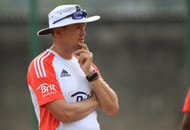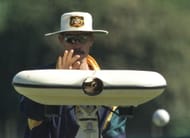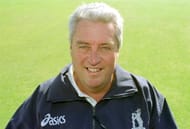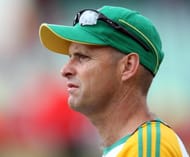In the early nineteenth century, students up at the University of Oxford used the term ‘coach’ to refer to a private tutor who would ‘carry’ a student of less ability through his or her examinations. Since then, the meaning of the word has been extended to include any instructor or trainer.
From simply honing a player’s craft, the coach’s role has undergone a lot of changes with the passage of time. Now, he is more of a mentor, friend, philosopher and guide to the younger lot. In tough times, it is primarily up to this father-figure to ensure that his players’ shoulders do not droop with the burden of expectations or succumb to the ruthless glare of the media spotlight.
The Indian cricket team has benefited from the services of a foreign coach ever since former New Zealand player John Wright took charge in 2000 after skipper Sourav Ganguly made it clear that the domestic trainer had outlived his utility. His emphasis on fielding, tips on batting to young players and excellent man-management skills allowed the team to enjoy an immensely successful five-year period – winning a home series against Australia, defeating Pakistan in an away series, and reaching the finals of the 2003 World Cup.
The coach is also an invaluable pillar of strength for a captain. After losing eight consecutive Test matches and the No. 1 ranking in the longer format of the game, both skipper MS Dhoni and coach Duncan Fletcher were subjected to intense scrutiny from the media and the fickle-minded Indian fans. The aging Fletcher stood by the normally unflappable Jharkhand lad, and the team promptly returned to winning ways; dishing out a 4-0 drubbing to Australia at home before winning the Champions Trophy and the tri-series in West Indies.
As we celebrate Teacher’s Day in India today, here is a list of the top five coaches in international cricket, who have revolutionised the teams during their tenure:
5. Dav Whatmore (Teams coached: Sri Lanka, Bangladesh, Pakistan)
The Sri Lanka-born Australian came into international reckoning when he coached his country of birth to victory in the 1996 World Cup. Intense, brash and a committed motivator, Whatmore has always striven to instill his own values and beliefs in almost all the teams that he has been put in charge of.
For a man who migrated with his family to Australia in 1962 and who did not have the assistance of a coach as he struggled to make a name for himself in international cricket, the transition from player to coach was natural. That coaching omission is, today, the base for a mentoring tactic that he has perfected over the years.
The results have been excellent – during his tenure with the Bangladesh team, the squad enjoyed relative success, thrashing both Pakistan and India in the 1999 and 2007 editions of the World Cup, and winning their first Test in 2005. He also guided the Pakistan team to the Asia Cup title in 2012 – ironically, they defeated Bangladesh in the final.
However, he did have conflicts with the outspoken former SL skipper Arjuna Ranatunga, leading the latter to suggest to the PCB that the Australian not be considered for the coaching role over Geoff Lawson. Nevertheless, his success rate in moulding competent teams is quite high and very impressive for a man who played only seven Tests and a single ODI.
4. Andy Flower (Teams coached: England)
The former Zimbabwean skipper and batting mainstay was appointed assistant coach of the England national team, replacing Matthew Maynard in May 2007. He was part of Peter Moores’ coaching setup, and ended his playing career at Essex after accepting this offer from the ECB.
In April 2009, after Moores was sacked, Flower, who was then serving as interim team director, was promoted to that role full-time. That summer, under his guidance, England won the Ashes 2-1, and followed it up by winning the 2010 ICC World Twenty20. Flower was also in charge when the Poms took the Ashes again in 2010-11, and helped them to a 4-0 win against the-then top-ranked Indians, thus dethroning the world champions.
Flower has received praise from all quarters for his handling of the star players in the team, and was awarded the Sports Personality Coach of the Year by the BBC in December 2011. He is rightly credited for imbuing a ruthless streak in the current national squad with his no-nonsense, hard taskmaster approach.
3. John Buchanan (Teams coached: Australia, Kolkata Knight Riders)
The bespectacled Queensland native took over from Geoff Marsh as coach of the Australian national team in October 1999 – a move that raised some eyebrows, given that he had never represented the country at the Test level. He enjoyed unprecedented success with the Kangaroos, guiding them to 16 consecutive Test wins and 23 ODI wins in World Cup tournaments.
Under his mentorship, Australia completed a hat-trick of World Cup titles – with Buchanan in charge for the 2003 and 2007 editions – and won a Test series in India for the first time in 35 years during the 2004 tour where current Australian captain Michael Clarke made his debut. In late 2006, he helped his side achieve their first Champions Trophy title, and also guided them through a successful 5-0 whitewash in the 2006-07 Ashes series.
Despite his excellent track record, his unorthodox methods were criticised by former players – including Shane Warne, who publicly suggested that Buchanan had actually inherited a world-class team and his presence only coincided with their victories. His tenure as KKR coach in the IPL was also less successful, and he was sacked in late 2009 following a poor showing in the second season.
Buchanan was widely known for his ruthless streak and game strategy during his time as Australian coach, and those traits are certainly needed if your side hopes to be world-beaters.
2. Bob Woolmer (Teams coached: South Africa, Pakistan)
The Kanpur-born former England batsman, who retired from first-class cricket in 1984, revolutionised South African cricket with his innovative coaching methods. Appointed as the Proteas’ coach in 1994, he spent the next five years guiding them to one triumph after another. His tenure saw the team win 10 out of their 15 Test series and 73% of the ODIs they participated in.
Woolmer was also known for incorporating computer analysis of opposing teams, and his practice of communicating via an earpiece with ex-skipper Hansie Cronje in the 1999 World Cup received widespread attention along with more than a few brickbats; the practice was later banned. After South Africa failed to secure a place in the finals of the same tournament, Woolmer resigned as coach.
He went on to become the coach of the Pakistan team in 2004, guiding them to a 4-2 ODI series triumph in India and drawing the preceding Test series 1-1. After the side were eliminated from the 2007 World Cup following a loss to Ireland, the coach was found dead in his hotel room in Jamaica, and his death still remains an unsolved mystery.
1. Gary Kirsten (Teams coached: India, South Africa)
The former South African opener succeeded the mercurial Greg Chappell as coach of the Indian team, taking over at a time when the Australian’s tenure had left a bad taste in everyone’s mouths, the early World Cup exit notwithstanding. Although Ravi Shastri and Lalchand Rajput had been appointed interim coaches for a short period, neither wanted to consider a long-term deputation in the role.
Kirsten officially took charge in 2008, guiding the team to a 1-1 draw against South Africa in the March-April 2008 Test series. He also coached them to the finals of the Kitply Cup and the Asia Cup in 2008, where India ended up second-best. However, a winning streak was formed when Kirsten led India to its first bilateral series win in Sri Lanka, secured wins in both Tests and ODIs against New Zealand in their own backyard for the first time in 40 years, and India also secured the No.1 position in the world Test rankings in 2009 under his tenure.
Gary received a perfect farewell when the Men in Blue lifted the 2011 World Cup in Mumbai, beating Sri Lanka by six wickets to secure the trophy after 28 years. He was widely praised for his people skills, and his tenure brought about an improvement in the batting of key players such as Gautam Gambhir and Virat Kohli. He is widely seen as the driving force behind the clearly visible improvements in each cricketer’s performance, motivating them and discussing tactics to be deployed on the field.
After his India sojourn, Gary returned home to take charge of the South African national side, leading them to the ICC No.1 ranking in Test cricket with a 2-0 victory over England. He took over from interim coach Corrie van Zyl, but stepped down from the post in August 2013, and will be taking up the challenge of coaching the Delhi Daredevils in the IPL.
Here’s a tribute video celebrating India’s cricket gurus:
Follow IPL Auction 2025 Live Updates, News & Biddings at Sportskeeda. Get the fastest updates on Mega-Auction and cricket news




